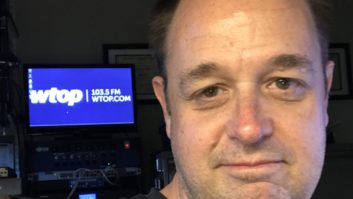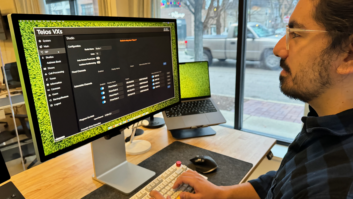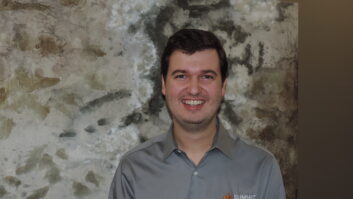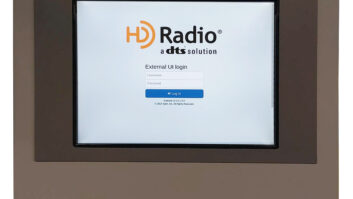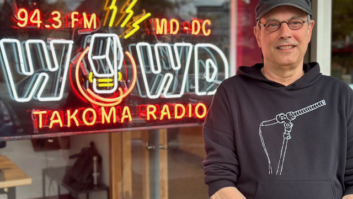It was in the spring of 1998 that I met Tony “Dee” DeNicola, a 27-year veteran of the broadcast business, for a tour of the WMCA transmitter site. Tony has starred on radio and worked as an engineer in the studio and at the transmitter facilities in Kearny, N.J. He also co-owns WODI(AM) in Brookneal, Va., with Dave Marthouse, as D&M Communications Inc.
I also met Tony’s 13-year-old son Brian, who co-hosted the tour. As Tony showed me around, I became aware that Brian knew the ropes and seemed to have a tremendous understanding of the business. I was impressed, if not envious. I hadn’t even seen a broadcast facility until I was about 16.
Brian seemed to work with his dad as a peer. I decided to visit Brian at his home to learn more about how this young man had become interested in the medium.
I decided it would be easiest to interview Brian on tape. I planned to bring my portable cassette recorder, but it occurred to me that Brian probably could supply the necessary environment.
He told me he had everything we would need.
Real-world experience
When I arrived at the DeNicola residence in Edison, N.J., earlier this year, Brian had just come home from his day at Edison High School. His mother welcomed me and Brian led me up the stairs into an eye-popping array of equipment on the second floor.
Was I in the Twilight Zone? No, I was at D&M Communications headquarters, with two rooms on the second floor dedicated to broadcasting. The one we used was Brian’s own fully operational studio, used for creating radio programs for WODI.
It’s interesting to talk to this young man and hear his perspectives on our business.
Brian DeNicola was born in 1985. His first experience with broadcast equipment was at the age of 4. His father would bring him to WEVD(AM) in New York, where Tony worked, and have Brian press the buttons on the cart machines. Little did listeners know that it was a 4-year-old starting the next cut.
Brian did not develop a real interest in the broadcast field until a bit later. He spent his time collecting coins, enjoying cartoons and model trains, reading and collecting Dr. Seuss books. But at 13, Brian trained at WEVD as a board operator.
He now works for Salem AM stations WMCA and WWDJ as a control operator and announcer, and weekends at Liberty Broadcasting – the former Talk America Radio Network – in Newark, N.J. while attending college. He runs the Lowell Ponte and Geoff Metcalf shows there. He also has worked as a board op, running analog reel-to-reel tape carts, turntables and modern computer-automated systems.
Brian, 18, has been doing his own show at WODI called “Today’s Best Music With Brian Dee” for three years. The format consists of alternative rock music. He visits WODI every other month to do the show, but otherwise creates it from his home studio onto reel-to-reel tape, which is then burned on CD. He now also does a weekly Internet show, “Today’s Best Music,” on www.darkstarradio.com
Brian graduated from Edison High School, class of 2003. This is a young man who, for a science fair project, set up an FM transmitter in the gymnasium, broadcasting throughout the school.
Atypical job
I asked Brian “Dee” where he learned his broadcast skills.
“My dad (taught me) basically everything. Then I branched off, watching other people and learning from other people.” He is attending Mercer County Community College in West Windsor, N.J., studying television and radio. Like many young people, he’s still formulating his goals. Among them: To work at Z-100 or WKTU as a jock or production engineer.
Among the celebrities that Brian has met in his work are Joe Franklin, Janet Leigh, June Lockhart, Al Lewis and Mike Myers. Brian also is excited by the fact that he has had the opportunity to do much more interesting work than a typical job of his peers during that period.
“It’s different from everybody else in high school.”
Asked how he feels about working a highly automated station, Brian feels radio was much more exciting when things were done manually, allowing for more creativity and spontaneity.
“I think the business needs to get away from the automated systems and the formats need to be more expanded and less tight like they are doing with a lot of the music stations,” he said. “There’s too much repetition.
“There’s nothing local anymore and DJs are restricted. They can’t say what they want to say,” he continued. “They can’t do their show the way they want to do it. They have to listen to what corporate says they have to do, everything is controlled by computer, and you have to say what the computer has to play. There’s no freedom in the business anymore and creativity is lost and will continue to get worse.
“If you just look at radio, how it was 10 years ago or back when it was really good in the 1960s and ’70s, if you listen to the air checks, the creativity was great. The disc jockeys were allowed to say what they wanted to say, and now everything is just so tightly formatted.
“Radio has to be interesting to get people to listen to it. It’s a theater of mind. I think playing five songs in a row without having somebody talking – if you want to hear that, you put your CD player on or satellite radio.”
Asked about HD Radio, Brian said that if it is marketed right, it could bring music back to AM and in fact eliminate the perceived differential between AM and FM. The variety and choices of talk and music would be spread among AM and FM stations, and the listener would be more oblivious to what mode they are listening to.
Some of Brian’s biggest challenges so far have been learning to sequence carts, tapes, records and show material in a precise manner.
“With practice,” he said, “you get used to it, learn to forget about what might go wrong and just deal with problems when they come.”
Readers can hear an aircheck of Brian DeNicola on WODI at www.wodiradio.com/brian, or catch him in the New York metropolitan area doing weather and spots on AM stations WMCA and WWDJ.
Visit Jim Hawkins’ Radio and Broadcast Technology Page online at www.jphawkins.com/radio.html





